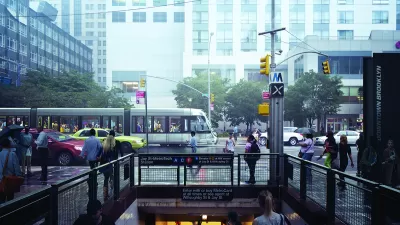One interesting detail to note: the BQX streetcar proposal, as its currently known, originated not from the de Blasio Administration but from a Brooklyn-based real estate company.
Dana Rubinstein has the scoop on the details of a city-commissioned report to study the Brooklyn-Queens Connector streetcar (BQX) proposal announced in February of this year.
The article reveals a few surprising details, the first being that the BQX was "dreamed up by executives at Two Trees, the DUMBO-based real estate company owned by the Walentas family." Also included are details about projected ridership, projects costs, and travel times. Rubinstein also reports that about" 70 percent of the route would get a dedicated right-of-way."
That last detail inspired Yonah Freemark to tweet his reactions to Rubinstein's article. Freemark's tweets include a reference to a February column he wrote to describe the necessary planning decisions for a successful BQX.
BQX, as I suspected, will have considerable portions without its own ROW. It also will run at 10.5 mph, not 12 mph as previously reported
— Yonah Freemark (@yfreemark) April 25, 2016
Sad to see concerns in my op-ed from Feb coming true, despite what consultants told me https://t.co/yRMHDPHZ4X https://t.co/v9qRr8FRsK
— Yonah Freemark (@yfreemark) April 25, 2016
FULL STORY: City gives new BQX streetcar details, and revs up outreach plan

Maui's Vacation Rental Debate Turns Ugly
Verbal attacks, misinformation campaigns and fistfights plague a high-stakes debate to convert thousands of vacation rentals into long-term housing.

Planetizen Federal Action Tracker
A weekly monitor of how Trump’s orders and actions are impacting planners and planning in America.

In Urban Planning, AI Prompting Could be the New Design Thinking
Creativity has long been key to great urban design. What if we see AI as our new creative partner?

King County Supportive Housing Program Offers Hope for Unhoused Residents
The county is taking a ‘Housing First’ approach that prioritizes getting people into housing, then offering wraparound supportive services.

Researchers Use AI to Get Clearer Picture of US Housing
Analysts are using artificial intelligence to supercharge their research by allowing them to comb through data faster. Though these AI tools can be error prone, they save time and housing researchers are optimistic about the future.

Making Shared Micromobility More Inclusive
Cities and shared mobility system operators can do more to include people with disabilities in planning and operations, per a new report.
Urban Design for Planners 1: Software Tools
This six-course series explores essential urban design concepts using open source software and equips planners with the tools they need to participate fully in the urban design process.
Planning for Universal Design
Learn the tools for implementing Universal Design in planning regulations.
planning NEXT
Appalachian Highlands Housing Partners
Mpact (founded as Rail~Volution)
City of Camden Redevelopment Agency
City of Astoria
City of Portland
City of Laramie



























